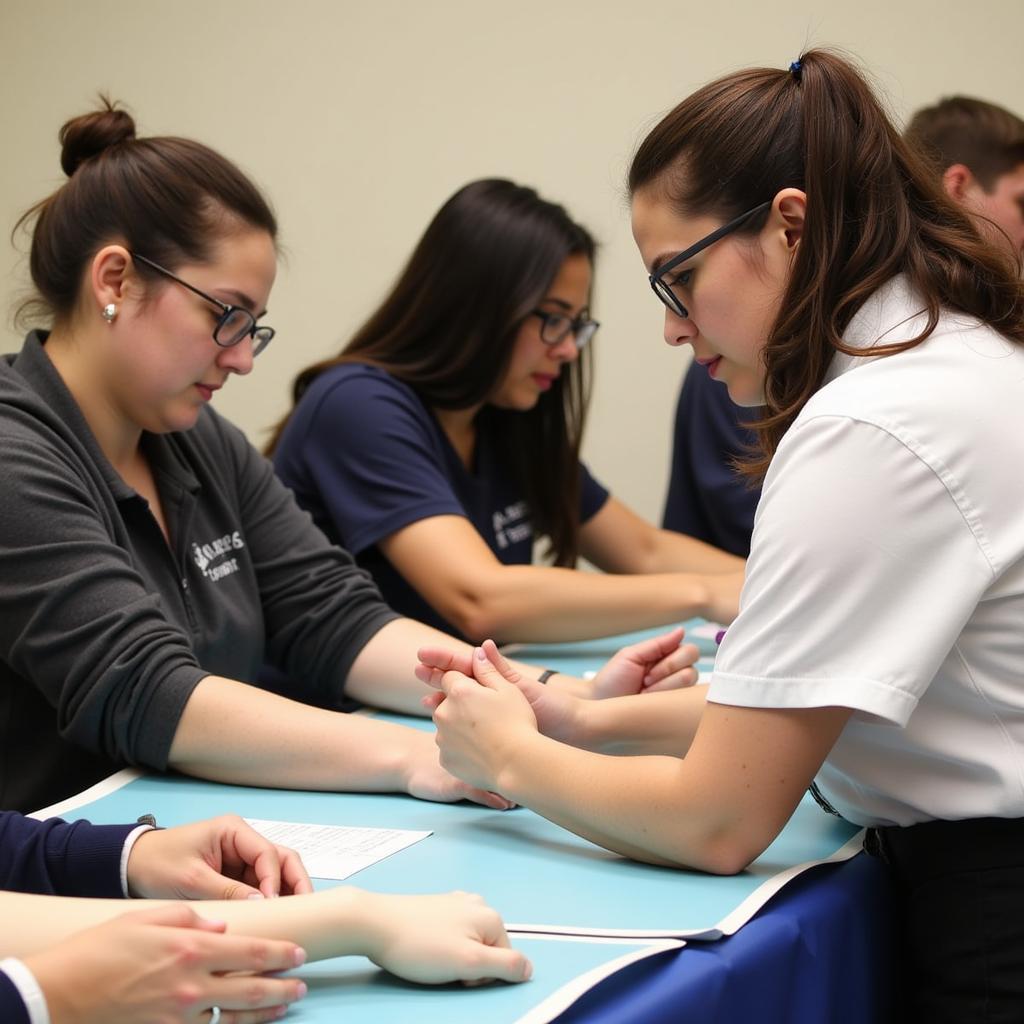Hospital Phlebotomy Jobs offer a unique opportunity to contribute to patient care in a fast-paced and dynamic environment. From collecting blood samples to handling lab requests, phlebotomists play a critical role in the diagnostic process. This career path is ideal for those seeking a hands-on healthcare role with opportunities for growth and specialization.
Exploring the World of Hospital Phlebotomy
Phlebotomy, the practice of drawing blood for diagnostic testing, transfusions, or research, is an essential function within any hospital setting. Hospital phlebotomists are trained professionals who perform venipunctures and capillary punctures to collect blood specimens. They interact directly with patients, ensuring their comfort and safety throughout the procedure. Beyond technical skills, successful phlebotomists possess strong interpersonal skills, empathy, and a commitment to patient well-being.
What Does a Hospital Phlebotomist Do?
The daily responsibilities of a hospital phlebotomist are diverse and demanding. They include:
- Identifying patients correctly and verifying their information.
- Explaining the procedure to patients and addressing any concerns.
- Selecting appropriate needles and collection tubes based on the requested tests.
- Performing venipunctures and capillary punctures efficiently and safely.
- Labeling and processing blood samples accurately.
- Maintaining proper infection control and safety protocols.
- Handling and transporting specimens to the laboratory.
- Maintaining patient records and documentation.
- Communicating with other healthcare professionals.
 Hospital Phlebotomist Collecting Blood Sample
Hospital Phlebotomist Collecting Blood Sample
Why Choose a Career in Hospital Phlebotomy?
Hospital phlebotomy jobs offer a variety of benefits for individuals interested in a healthcare career.
- Direct Patient Interaction: Phlebotomists have the opportunity to make a positive impact on patients’ lives by providing compassionate and skilled care.
- Job Security: The demand for qualified phlebotomists remains consistently high due to the essential nature of their role in healthcare.
- Career Advancement: With experience and additional training, phlebotomists can advance to supervisory roles or specialize in areas such as therapeutic phlebotomy or blood bank technology.
- Flexible Schedule: Hospitals operate around the clock, providing opportunities for various shift patterns and part-time or full-time employment.
What Qualifications are Needed for Hospital Phlebotomy Jobs?
Most hospital phlebotomy jobs require a high school diploma or equivalent. Completion of a phlebotomy training program from an accredited institution is highly preferred and often required. These programs typically include coursework in anatomy, physiology, phlebotomy techniques, and laboratory procedures. Certification from a recognized phlebotomy organization, such as the American Society for Clinical Pathology (ASCP), further enhances job prospects and demonstrates professional competency.
 Phlebotomy Training Program: Students Practicing Venipuncture
Phlebotomy Training Program: Students Practicing Venipuncture
Finding Hospital Phlebotomy Jobs
Hospital phlebotomy jobs are often advertised on hospital websites, online job boards, and through professional organizations. Networking with healthcare professionals can also lead to job opportunities. When searching for hospital phlebotomy jobs, pay close attention to the required qualifications, experience, and certifications.
What is the Salary Expectation for Hospital Phlebotomists?
Salaries for hospital phlebotomy jobs can vary based on experience, location, and employer. According to the Bureau of Labor Statistics, the median annual wage for phlebotomists was $XX,XXX in 20XX. Benefits such as health insurance, paid time off, and retirement plans are often offered as part of the compensation package.
 Hospital Laboratory Setting with Phlebotomy Equipment
Hospital Laboratory Setting with Phlebotomy Equipment
Launching Your Career in Hospital Phlebotomy
A career in hospital phlebotomy can be both challenging and rewarding. By obtaining the necessary qualifications, honing your skills, and demonstrating a genuine commitment to patient care, you can embark on a fulfilling career path in this vital area of healthcare. Hospital phlebotomy jobs offer a tangible way to contribute to the well-being of others while building a successful and meaningful career.
“Phlebotomy is much more than just drawing blood,” says Dr. Amelia Sanchez, a seasoned pathologist at San Jose Hospital. “It’s about building trust with patients and ensuring the accuracy of crucial diagnostic tests. It’s a cornerstone of modern medicine.”
In conclusion, hospital phlebotomy jobs represent a dynamic and rewarding career choice for those passionate about patient care. The demand for skilled phlebotomists is projected to grow, making it an excellent option for those seeking a stable and fulfilling career in healthcare.
“The ability to connect with patients and put them at ease is essential for any successful phlebotomist,” adds Dr. Michael Chen, Head of Phlebotomy Services at San Jose Hospital. “Technical skills are important, but empathy and compassion are truly invaluable.”
 Experienced Phlebotomist Mentoring a New Employee
Experienced Phlebotomist Mentoring a New Employee
For support, contact us at Phone: 02437655121, Email: [email protected] or visit us at 298 Cau Dien St., Minh Khai, Bac Tu Liem, Hanoi, Vietnam. We have a 24/7 customer service team.